Arizona’s congressional deficit hawks mostly caved when confronted with the political realities of the razor-thin Republican majority in the U.S. House and the need to adopt a budget.
The threatened rebellion of Republican Congressmen Eli Crane, Paul Gosar and Andy Biggs died down in a final flurry of negotiations on the “big beautiful” budget bill that Speaker Mike Johnson pushed through the House with the backing of President Donald Trump.
Biggs, Crane and Gosar all voted for the package, even though it will massively increase the U.S. debt.
Republican U.S. Rep. Juan Ciscomani also supported the measure, even after pledging to protect Medicaid funding, which the proposal slashes. So did Rep. Abraham Hamadeh. Republican Rep. David Schweikert slept through the late-night vote — but said he would have supported the bill had he been awake.
Arizona’s two Democratic members of Congress voted against it.
Now, the budget package heads to a skeptical U.S. Senate with a similarly razor-thin Republican majority. Senators return from their recess today.
If the budget becomes law, it will deal a serious blow to rural Arizona.

A lot more people in rural areas rely on Medicaid — known as AHCCCS in Arizona. The program covers 26% of residents statewide — but twice that in rural counties like Navajo and Apache.
Enrollment has already declined by about 10% since pandemic-era restrictions on dropping people were themselves dropped. The additional changes in Medicaid could cut the ranks of the insured by another 10-15%, according to the projections of the Congressional Budget Office.
The last stand of the deficit hawks won a few concessions on the spending side. The final House package moved up the imposition of a work requirement for Medicaid. The work requirements would take effect in 2026, instead of the 2029 deadline in the original bill.
Numerous studies suggest that a work requirement with monthly verification will cause a big drop in people who qualify for the program — often due to paperwork problems.
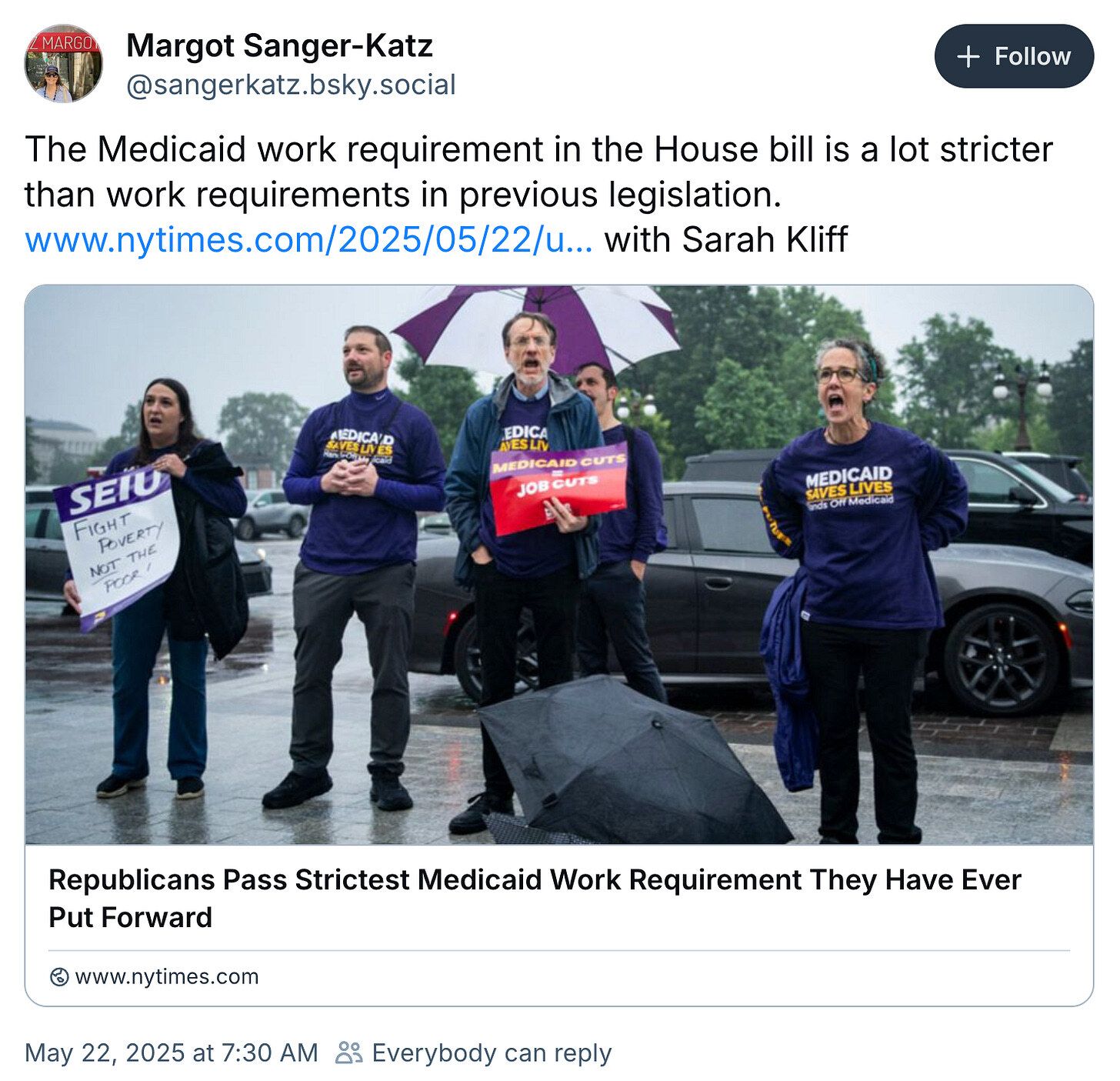
The compromise bill also accelerated the elimination of tax breaks for industrial solar and wind projects — which are major job creators in some parts of rural Arizona.
And last-minute changes in the bill also increased the national deficit by raising the State and Local Tax (SALT) deduction for people in states with high state taxes from $30,000 to $40,000. (The current cap is just $10,000.) And the size of the deduction would shrink for people making more than $500,000 — compared to the $400,000 in the original bill.
That change to the SALT deduction cap alone is projected to add approximately $129 billion to the national deficit over the next decade.
And while the increased SALT tax deduction will help vulnerable Republican congressmen in high-tax states like California, it won’t have much effect in Arizona, with its nearly flat income tax rate.
All told, the package will add $2.3 trillion to the debt over the next decade, according to the Congressional Budget Office.
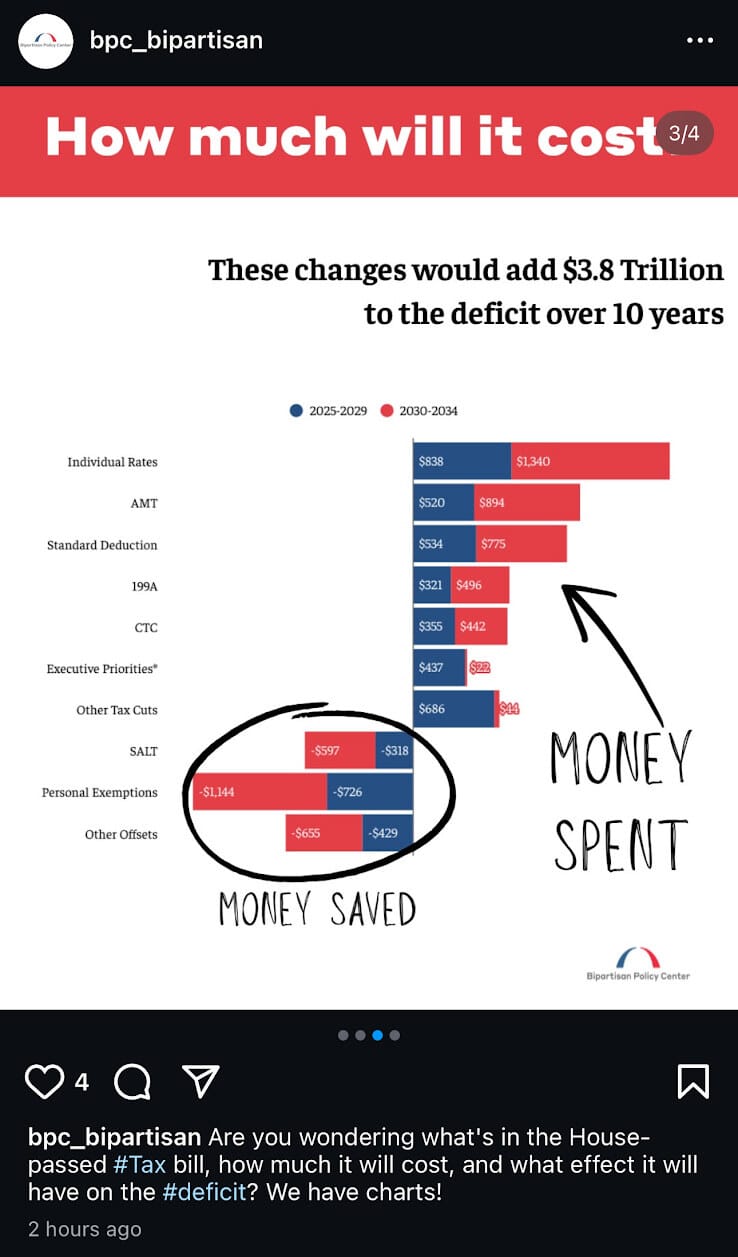
Any savings created by spending cuts were overwhelmed by the extension of the current income tax cuts, plus changing the income tax rate for tips and overtime — a prominent Trump campaign promise.
Crane, Biggs and Gosar have all been fierce critics of the soaring deficit — now at record levels. The national debt now exceeds the annual Gross Domestic Product — which it hasn’t done since the peak of World War II.
Lloyd Doggett, a Texas Democrat, said, “The deficit hawks have become chicken hawks tonight in submission to Trump, the self-described king of debt,” per the New York Times.
Or, as U.S. Rep. Thomas Massie of Kentucky — one of only two Republicans to vote against the final package — put it:
“This bill is a debt bomb ticking. We’re not rearranging deck chairs on the Titanic tonight. We’re putting coal in the boiler and setting a course for the iceberg.”
For decades, both parties have embraced political expediency to argue that the deficit really doesn’t matter.
The Democrats increase spending — without raising taxes. The Republicans reduce taxes, mostly without cutting spending.
Can you say Voodoo Economics?
Bill Clinton was the last President to balance the budget. During Trump’s first term, he added somewhere near $8 trillion to the national debt.
Hamadeh perhaps best summed up the thinking of former budget hawks when it comes to the massive deficit increase that Trump’s budget bill contains.
“Honestly, how I see my role is — President Trump knows what he's doing,” he told a podcast host. “President Trump has a strategy. He needs backup. He needs support in Congress. Yes, there's been plenty of deficits, and the national debt is out of control, but we have to understand that we didn't we, we, I wasn't here for that increase.”
The final package still must wind its way through the Senate.
However, the prospects for Medicaid (AHCCCS) appear bleak in any scenario.
The package actually increases spending on some of the federal budget's most expensive items. Defense accounts for 13% of spending, Social Security for 21% and interest on the debt for 13%. That adds up to about 47% of federal spending, according to a summary by the Center on Budget Priorities.
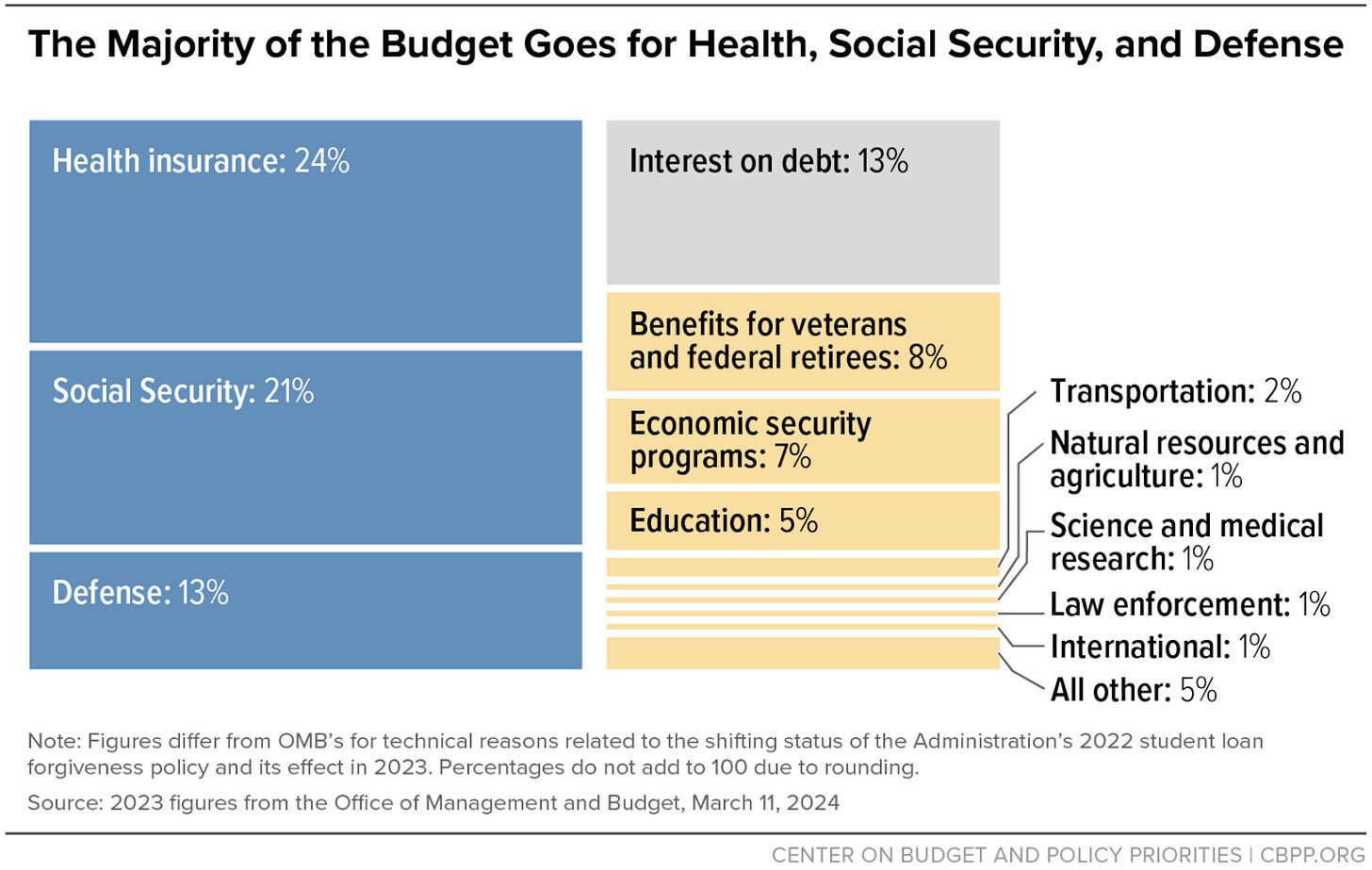
Health insurance accounts for 25% of spending — but that includes Medicare for seniors, which is a political third rail when it comes to cuts.
All the other federal spending amounts to pocket change. Veterans benefits and retirees come to 8%, welfare programs 7%, education 5%, science and medical research, law enforcement and international aid each come to about 1%.
So Congress can’t make much of an impact on the deficit unless it combines tax increases with spending cuts.
However, they can rip new holes in the safety net — and maybe drive rural hospitals out of business with cuts in AHCCCS. In rural areas, AHCCCS is an already frayed safety net in counties with a chronic shortage of doctors and nurses and hospitals on the fiscal cliff edge.
Already, AHCCCS provides insurance for a majority of children and most births — not to mention nursing home residents. AHCCCS costs $2 billion in Arizona. The state enjoys one of the highest reimbursement rates in the country — with 83% of the costs covered by the federal government.
The Congressional Budget Office concluded that the tax and spending cuts will help the rich and hurt the poor.
The CBO analysis said that by 2027, people in the bottom 10% will lose the equivalent of 2% of their income, while the people in the top 10% will enjoy a 4% increase in their income.
That’s why Democratic Minority Leader Hakeem Jeffries couldn’t contain a certain political glee after the vote.
“I think that when the story is told of the 119th Congress, when the votes are ultimately cast on that first Tuesday in November next year, that this day may very well turn out to be the day that House Republicans lost control of the United States,” he said, according to the Times.
But in the meantime, brace for another 10% of the AHCCCS and Affordable Care Act population losing health care coverage — with higher numbers in rural areas.

The court stakeouts continue: Federal immigration officials returned to Phoenix’s immigration court last week to detain migrants whose cases were dismissed as part of Trump’s continued bid to arrest people showing up for scheduled immigration hearings, the Arizona Mirror’s Gloria Gomez reports. ICE agents were staring through binoculars on top of a parking structure to track down people leaving court in cars, then relaying that information to other federal officials who followed them in white vans. That same day, Arizona U.S. Rep. Yassamin Ansari toured an immigration detention center in Eloy, where two detainees have died this year, and said a group of women told her horror stories. Female detainees said a guard forced them to walk around the facility’s yard in the heat without water as they yelled degrading comments, per the Phoenix News Times’ Morgan Fischer.
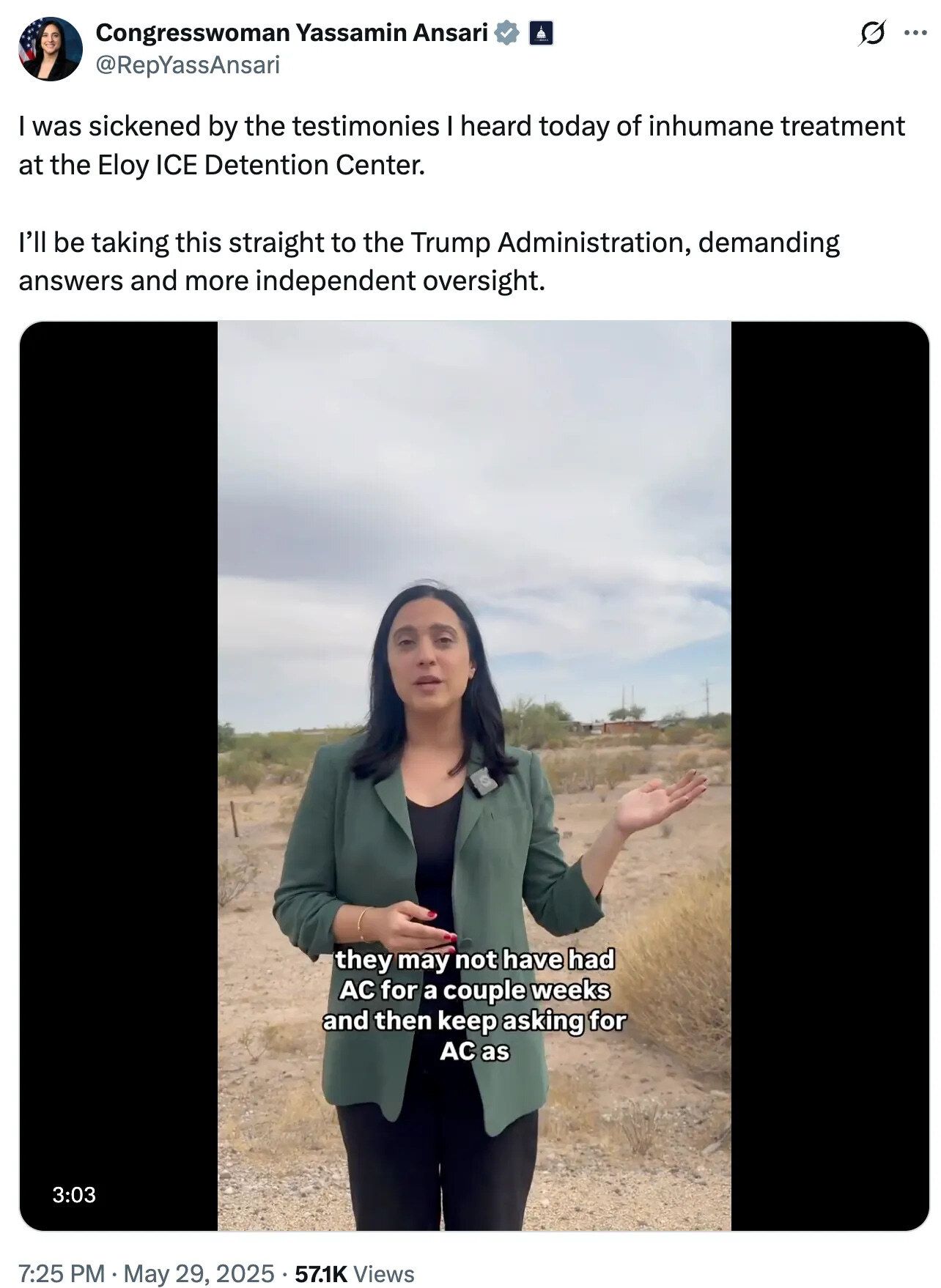
This is America: Two ICE agents told a Tucson woman they worked for Tucson Electric Power as a way to get information on her neighbor, who doesn’t have legal status, KGUN’s Reyna Preciado reported. After news broke of the incident, eight Democratic lawmakers from the Tucson area sent out a news release saying the Trump administration’s mass deportation program is leading federal agents to “lying and obliterating ethical lines,” along with due process.
Help the (non-transgender) boys: Arizona U.S. Sen. Ruben Gallego called concerns about transgender athletes in sports “legitimate” in an interview with The Dispatch, and said states should get to decide how to police biological separation, Politico writes. In case you forgot, Gallego is a Democrat, and he now joins the likes of other Democrats, like California Gov. Gavin Newsom, who have strayed from their party on the transgender rights issue. Meanwhile, Democrats are trying to win back young male voters, and Gallego told The Hill the party should be “helping these guys become successful and rich.”
Offline budgeting: The biggest obstacle in budget negotiations is that Republican House and Senate members aren’t on the same page, Gov. Katie Hobbs said during her latest appearance on “Outspoken with Bruce and Gaydos.”
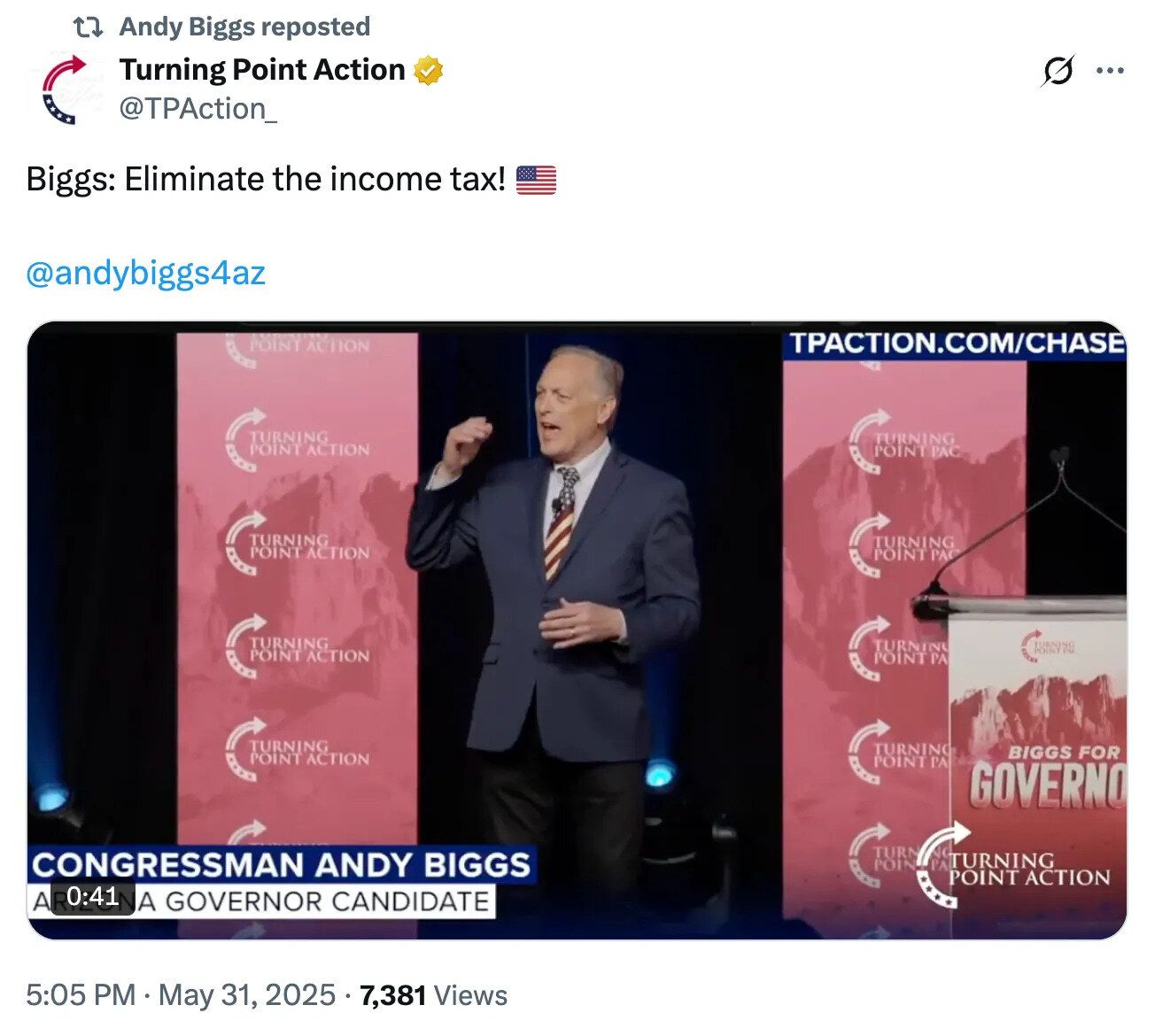
Y’all Qaeda: A Colorado man who blamed his online threats against Hobbs and other Democratic election officials on watching too much far-right content got sentenced to three years in prison, per the Associated Press. Teak Ty Brockbank was specifically drawn to QAnon conspiracies, and the judge said “keyboard terrorism” should be taken seriously.
Rodeo ruling and school scapegoating: Nearly two years after two Prescott residents sued over lawmakers’ attempts to give $15.3 million to the Prescott rodeo, a judge ruled the funding would violate the state’s Gift Clause that prohibits the government from giving handouts without a clear public benefit, the Republic’s Ray Stern reports.
Same rule but for Congress: Lawmakers are still trying to punish the people responsible for the Isaac School District’s financial mismanagement. State senators approved a bill to make school board members resign if their district is placed into a receivership, and it’s retroactive to before the Isaac district overspent its budget and state receivers took over, per the Capitol Times’ Jakob Thorington.
Record high: The data from this year’s point-in-time count is in, and the number of people experiencing homelessness in Maricopa County increased 3% from last year, Axios’ Jeremy Duda writes. 2024’s count saw a rare decrease in homelessness, but this year was the highest the county has seen since it started counting in 2007. The Maricopa Association of Governments, which conducts the count, said the increase is partly due to a lapse in federal funding that used to pay for more than 1,000 shelter beds.
A clucking lot of chickens: Hickman Farms has lost 95% of its Arizona chickens — or about 6 million hens — to the bird flu. They closed their massive West Valley farm and expect egg prices to increase, per the Republic’s Corina Vanek.
Pass the bill!: Today is the anniversary of the car bombing that killed investigative journalist Don Bolles 49 years ago. The Republic’s Richard Ruelas has a roundup of the final stories Bolles was working on. And the state Senate still hasn’t voted on the bill to create a monument honoring Bolles at the state Capitol. The state House has passed the bill twice this year, both times with overwhelming margins. Whether the bill gets a vote is up to Senate President Warren Petersen.

The thin-skinned Fountain Hills Town Council removed its desk for reporters to punish the local paper, the Fountain Hills Times Independent, because a few members didn’t like the paper’s coverage.
“Frankly, I am fed up with the Times partisan reporting and think it is time to remove the corner ‘reporters’ table,” Councilmember Rick Watts said in an email.
Fittingly, the whole issue came to light when another councilwoman wrote an oped in the Fountain Hills Times Independent criticizing her thin-skinned colleagues.
“The action appears to be part of our town’s MAGA whisper campaign to shut down the town paper,” Councilwoman Cindy Couture wrote. “Think what our town would be without it, just a mess of Facebook misinformation.”
Fountain Hills residents are pissed, as the New Times’ TJ L'Heureux writes.
“It’s really hard for me to characterize it in any way other than shades of fascism,” Faryl Palles, a 22-year resident of Fountain Hills, told New Times. “I think they mean to trample any critiques of what they’re doing. I think they mean to govern non-transparently, even though Mayor (Gerry) Friedel campaigned on being transparent.”

